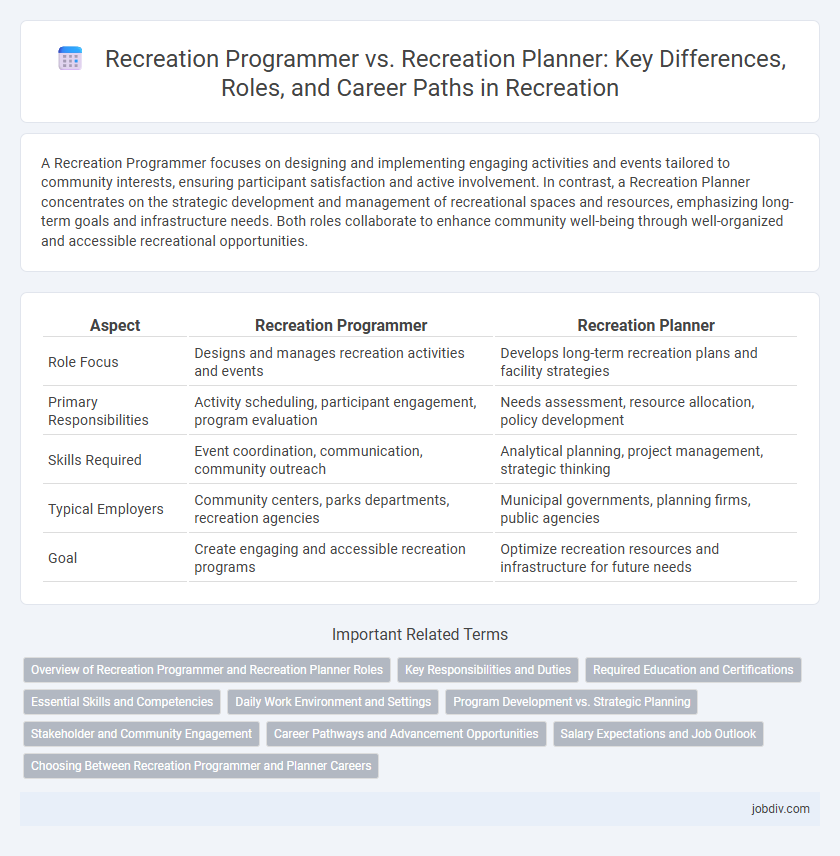A Recreation Programmer focuses on designing and implementing engaging activities and events tailored to community interests, ensuring participant satisfaction and active involvement. In contrast, a Recreation Planner concentrates on the strategic development and management of recreational spaces and resources, emphasizing long-term goals and infrastructure needs. Both roles collaborate to enhance community well-being through well-organized and accessible recreational opportunities.
Table of Comparison
| Aspect | Recreation Programmer | Recreation Planner |
|---|---|---|
| Role Focus | Designs and manages recreation activities and events | Develops long-term recreation plans and facility strategies |
| Primary Responsibilities | Activity scheduling, participant engagement, program evaluation | Needs assessment, resource allocation, policy development |
| Skills Required | Event coordination, communication, community outreach | Analytical planning, project management, strategic thinking |
| Typical Employers | Community centers, parks departments, recreation agencies | Municipal governments, planning firms, public agencies |
| Goal | Create engaging and accessible recreation programs | Optimize recreation resources and infrastructure for future needs |
Overview of Recreation Programmer and Recreation Planner Roles
Recreation Programmers design, organize, and implement activities and events that promote community engagement, wellness, and leisure, focusing on participant needs and interests. Recreation Planners develop strategic plans, assess community resources, and allocate funding to create sustainable recreational opportunities aligned with long-term goals. Both roles collaborate to enhance public recreation services but differ in operational execution versus strategic development within parks and recreation management.
Key Responsibilities and Duties
Recreation programmers design and organize activities, focusing on participant engagement and event execution within community centers, parks, or recreational facilities. Recreation planners develop strategic plans for recreational services, conduct needs assessments, and allocate resources to enhance community well-being through sustainable program development. Both roles collaborate to ensure recreational offerings meet public demand and comply with regulatory guidelines.
Required Education and Certifications
Recreation programmers typically need a bachelor's degree in recreation, leisure studies, or a related field, with certifications such as CPR, first aid, and Certified Park and Recreation Professional (CPRP) enhancing job prospects. Recreation planners often require at least a bachelor's degree in urban planning, recreation management, or public administration, with professional credentials like the American Institute of Certified Planners (AICP) or Certified Recreation Planner (CRP) being highly valued. Both roles benefit from specialized training in community engagement, program development, and resource management to effectively design and implement recreational activities and facilities.
Essential Skills and Competencies
Recreation Programmers excel in creativity, event coordination, and direct community engagement, emphasizing skills in group facilitation, activity design, and communication to deliver successful recreational activities. Recreation Planners focus on strategic thinking, analytical skills, and project management, specializing in needs assessment, resource allocation, and long-term program development to ensure sustainable recreational services. Both roles require strong interpersonal skills and knowledge of community demographics, but Programmers prioritize hands-on interaction while Planners emphasize organizational strategy and policy development.
Daily Work Environment and Settings
Recreation programmers typically work directly within community centers, parks, or recreational facilities, organizing and supervising activities in dynamic, fast-paced environments. Recreation planners operate mainly in office settings, developing long-term plans, policies, and budgets to enhance recreational services across municipalities or organizations. Both roles require collaboration with various stakeholders but differ in their balance of fieldwork versus administrative tasks.
Program Development vs. Strategic Planning
Recreation Programmers specialize in program development by designing, organizing, and implementing recreational activities tailored to community needs and interests. Recreation Planners focus on strategic planning, analyzing community demographics and resources to create long-term recreational frameworks that support sustainable growth. Both roles collaborate to enhance recreational services, ensuring immediate engagement through programs and future success through comprehensive planning.
Stakeholder and Community Engagement
Recreation Programmers focus on direct community engagement by designing and implementing activities that meet the interests and needs of diverse stakeholder groups. Recreation Planners emphasize strategic collaboration with stakeholders to develop long-term recreational frameworks that align with community goals and resource management. Both roles prioritize fostering strong relationships with local residents, organizations, and government entities to enhance the overall recreational experience and accessibility.
Career Pathways and Advancement Opportunities
Recreation Programmers typically focus on designing and implementing activity schedules and community programs, making them ideal for entry-level positions with opportunities to advance into supervisory roles or specialized program coordination. Recreation Planners engage in strategic development of recreational spaces and long-term community planning, often requiring higher education such as a degree in urban planning or recreation management, with career progression leading to senior planning roles or director positions. Both career paths offer advancement through gaining certifications like CPRP (Certified Park and Recreation Professional) and experience in project management or community engagement.
Salary Expectations and Job Outlook
Recreation Programmers typically earn between $40,000 and $55,000 annually, focusing on organizing and implementing community activities, with job growth projected at 7% through 2030. Recreation Planners, who design and develop comprehensive recreational programs and facilities, often command higher salaries ranging from $50,000 to $70,000, supported by a similar 7-9% employment increase expected in the next decade. Both roles benefit from expanding public and private sector investment in health and wellness initiatives, driving steady demand within the recreation industry.
Choosing Between Recreation Programmer and Planner Careers
Recreation programmers focus on designing and implementing specific activities and events that engage community members, requiring strong skills in event management and participant interaction. Recreation planners analyze community needs and develop long-term recreational plans, emphasizing strategic planning, budgeting, and collaboration with local agencies. Choosing between careers depends on whether one prefers hands-on activity coordination or a broader role in shaping recreational policies and infrastructure.
Recreation Programmer vs Recreation Planner Infographic

 jobdiv.com
jobdiv.com